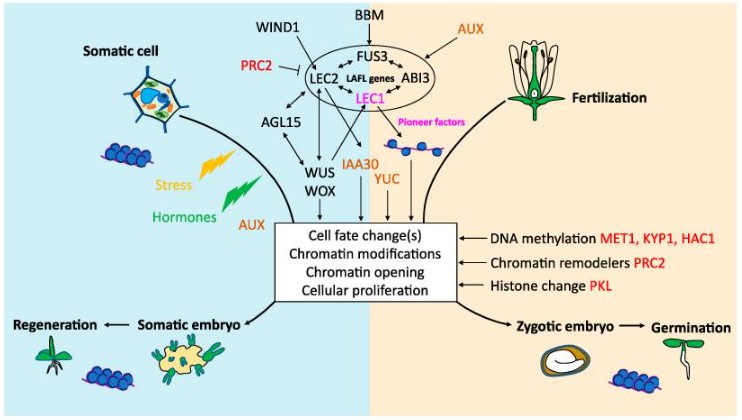Somatic embryogenesis is a method of asexual reproduction that can occur naturally in a wide range of plant species, whereby plants form embryos without meiosis and fertilization. Somatic embryogenesis demonstrates the totipotency of plant cells. It is of considerable importance both theoretically and practically, as it can be used to combine efficient cloning of desired genotypes with genetic modification. Somatic embryogenesis was first reported in the tissue culture of carrots and later confirmed in many species. Understanding the mechanisms controlling somatic embryogenesis and its regulation is a critical issue in plant biology. Because somatic embryogenesis is now widely used for clonal propagation, transformation, and regeneration of different crops. However, somatic embryogenesis involves complex, if not characterized, genetic inheritance. Certain species or specific genotypes may show resistance to somatic embryogenesis and fail to experience it even under favorable conditions.
 Fig. 1. General overview of genes involved in somatic embryogenesis or zygotic embryogenesis in interaction with LEC1, ABI3, FUS3, and LEC2 (LAFL) transcription factors. (Salaün et al., 2021)
Fig. 1. General overview of genes involved in somatic embryogenesis or zygotic embryogenesis in interaction with LEC1, ABI3, FUS3, and LEC2 (LAFL) transcription factors. (Salaün et al., 2021)
Plant regeneration from healing tissue culture can be used to improve economically important crops but is often associated with undesirable genetic and cytological variation. Lifeasible is an industry leader in plant tissue culture, providing customers worldwide with effective somatic embryogenesis and plant regeneration solutions. Working closely with developmental biology, we utilize molecular approaches to improve the somatic embryogenesis process in plants. Based on our advanced technology platform and experienced team of experts, we are committed to cultivating more somatic embryos through the somatic embryogenesis pathway.
We offer protocols for regenerating plants from cultured plant explants via somatic embryogenesis. We first identify commercial varieties that can be regenerated through somatic embryogenesis and then optimize production conditions. Production conditions are then optimized to improve the somatic embryogenesis process. Ultimately, a mature explant was developed to improve crops through plant biotechnology approaches. We select suitable somatic embryogenesis regeneration plants for you includes soybean (Glycine max L.), cultivated tea (Camellia sinensis (L). O. Kuntze), Capsicum baccatum L., Green gram (Vigna radiata L.), Buckwheat (Fagopyrum esculentum), Rose, Brassica oleracea var. botrytis, carrots, woody plants, etc.
We offer a wide range of services to provide a one-stop solution for all our customers:
Lifeasible has extensive research experience in somatic cell embryogenesis and plant regeneration, providing a reliable mass propagation system for plant tissue culture. Our solutions are essential for plant genetic transformation and the development of transgenic plants. Contact us today to learn more about our services.
Reference